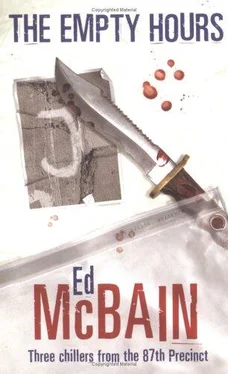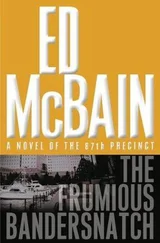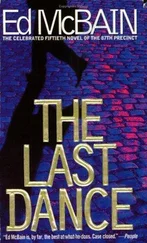“Who taught you how to handle evidence?” Hawes asked heatedly.
Sheriff Watt sauntered over to where the pair were arguing. He grinned amiably and said, “What seems to be the trouble here, hmmm?” He sang out the “hmmm,” his voice rising pleasantly and cheerfully. A nineteen-year-old girl lay dead at his feet, but Sheriff Watt thought he was an old alumnus at Dartmouth’s Winter Carnival.
“Feller here’s a city detective,” the deputy said.
“That’s good,” Watt said. “Please to have you with us.”
“Thanks,” Hawes said. “Your man here was just smearing any latent prints there may be on that weapon.”
“What weapon?”
“The ski pole,” Hawes said. “What weapon do you think I…?”
“Oh, won’t be no fingerprints on that, anyway,” Watt said.
“How do you know?”
“No damn fool’s gonna grab a piece of metal with his bare hands, is he? Not when the temperature’s ten below zero, now is he?”
“He might have,” Hawes said. “And while we’re at it, don’t you think it’d be a good idea to stop that lift? You’ve already had one person smearing up whatever stuff you could have found in the ...”
“I got to get my men up here before I order the lift stopped,” Watt said.
“Then restrict it to the use of your men.”
“I’ve already done that,” Watt said briefly. He turned back to his deputy. “Want to let me see that pole, Fred?”
“Sheriff, you let him touch that pole again, and ...”
“And what?”
“... and you may ruin ...”
“Mister, you just let me handle this my own which-way, hmmm? We been in this business a long time now, and we know all about skiing accidents.”
“This wasn’t an accident,” Hawes said angrily. “Somebody shoved a ski pole into that girl’s chest, and that’s not ...”
“I know it wasn’t an accident,” Watt said. “That was just a manner of speaking. Let me have the pole, Fred.”
“Sheriff...”
“Mister, you better just shut up, hmmm? Else I’ll have one of my men escort you down the mountain, and you can warm your feet by the fire.”
Hawes shut up. Impotently, he watched while the deputy named Fred seized the ski pole in both hands and yanked it from Helga’s chest. A spurt of blood followed the retreating pole, welled up into the open wound, overflowed it, was sopped up by the sodden sweater. Fred handed the bent pole to the sheriff. Watt turned it over and over in his big hands.
“Looks like the basket’s been taken off this thing,” he said.
The basket, Hawes saw, had indeed been removed from the bottom of the aluminum pole. The basket on a ski pole is a circular metal ring perhaps five inches in diameter, crossed by a pair of leather thongs. A smaller ring stamped into the thongs fits over the end of the pointed pole and is usually fastened by a cotter pin or a tight rubber washer. When the basket is in place on the end of a pole, it prevents the pole from sinking into the snow, thereby enabling the skier to use it in executing turns or maintaining balance. The basket had been removed from this particular pole and, in addition, someone had sharpened the normally sharp point so that it was as thin as a rapier. Hawes noticed this at once. It took the sheriff a little while longer to see that he was holding a razor-sharp weapon in his hands, and not a normally pointed pole.
“Somebody been working on the end of this thing,” he said, the dawn gradually breaking.
A doctor had come up the lift and was kneeling beside the dead girl. To no one’s particular surprise, he pronounced her dead. One of the sheriff’s bumbling associates began marking the position of the body, tracing its outline on the snow with a blue powder he poured liberally from a can.
Hawes couldn’t imagine what possible use this imitation of investigatory technique would serve. They were marking the position of the body, true, but this didn’t happen to be the scene of the crime. The girl had been murdered on a chair somewhere between the base of the mountain and the top of the lift. So far, no one had made any attempt to locate and examine the chair. Instead, they were sprinkling blue powder onto the snow, and passing their big paws all over the murder weapon.
“May I make a suggestion?” he asked.
“Sure,” Watt said.
“That girl got on the lift with someone else. I know because I dropped my poles down there, and when I turned for a look, there were two people in that chair. But when she reached the station here, she was alone.”
“Yeah?” Watt said.
“Yeah. I suggest you talk to the loader down below. The girl was a ski instructor, and they may have recognized her. Maybe they know who got on the chair with her.”
“Provided anyone did.”
“Someone did,” Hawes said.
“How do you know?”
“Because ...” Hawes took a deep breath. “I just told you. I saw two people in that chair.”
“How far behind you?”
“Four chairs behind.”
“And you could see four chairs behind you in this storm, hmmm?”
“Yes. Not clearly, but I could see.”
“I’ll just bet you could,” Watt said.
“Look,” Hawes insisted, “someone was in that chair with her. And he undoubtedly jumped from the chair right after he killed her. I suggest you start combing the ground under the lift before this snow covers any tracks that might be there.”
“Yes, we’ll do that,” Watt said. “When we get around to it.”
“You’d better get around to it soon,” Hawes said. “You’ve got a blizzard here, and a strong wind piling up drifts. If ...”
“Mister, I hadn’t better do anything. You’re the one who’d just better butt his nose out of what we’re trying to do here.”
“What is it you’re trying to do?” Hawes asked. “Compound a felony? Do you think your murderer’s going to sit around and wait for you to catch up to him? He’s probably halfway out of the state by now.”
“Ain’t nobody going noplace, mister,” Watt said. “Not with the condition of the roads. So don’t you worry about that. I hate to see anybody worrying.”
“Tell that to the dead girl,” Hawes said, and he watched as the ski patrol loaded her into a basket and began taking her on her last trip down the mountain.
Death is a cliché, a tired old saw.
He had been a cop for a good long time now, starting as a rookie who saw death only from the sidelines, who kept a timetable while the detectives and the photographers and the assistant M.E. and the laboratory boys swarmed around the victim like flies around a prime cut of rotten meat. Death to him, at that time, had been motion-picture death. Standing apart from death, being as it were a uniformed secretary who took the names of witnesses and jotted in a black book the arrivals and departures of those actually concerned with the investigation, he had watched the proceedings dispassionately. The person lying lifeless on the sidewalk, the person lying on blood-soaked sheets, the person hanging from a light fixture, the person eviscerated by the onrushing front grille of an automobile, these were all a trifle unreal to Hawes, representations of death, but not death itself, not that grisly son of a bitch.
When he became a detective, they really introduced him to death.
The introduction was informal, almost causal. He was working with the 30th Squad at the time, a very nice respectable squad in a nice respectable precinct where death by violence hardly ever came. The introduction was made in a rooming house. The patrolman who had answered the initial squeal was waiting for the detectives when they had arrived. The detective with Hawes asked, “Where’s the stiff?” and the patrolman answered, “He’s in there,” and the other detective turned to Hawes and said, “Come on, let’s take a look.”
Читать дальше












